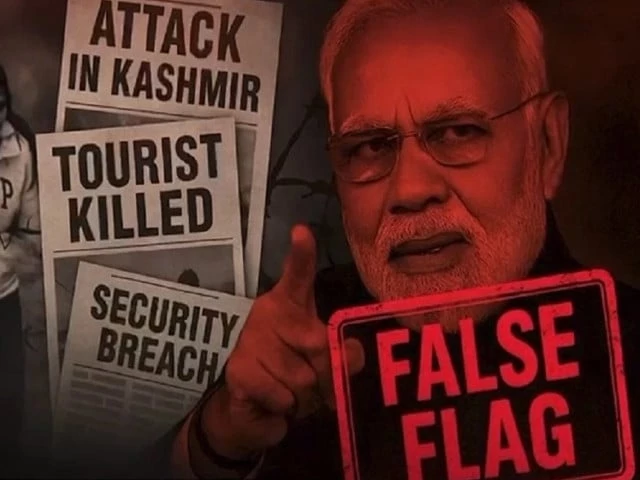Pakistan exposes Indian aggression and lies in historic victory, issues dossier
The dossier also highlights Pakistan’s calls for India to conduct transparent investigation into the Pahalgam attack

Pakistan has issued a dossier detailing what it describes as irrefutable evidence of Indian aggression, a coordinated disinformation campaign, and false flag operations, including the recent Pahalgam incident, which was used as a pretext for unprovoked aggression against Pakistan.
At least 24 people were killed in Indian Illegally Occupied Jammu and Kashmir (IIOJK) after gunmen opened fire on a group of tourists. The incident occurred in Pahalgam, a well-known tourist destination.
Following the attack, a confidential document surfaced on the messaging platform Telegram, revealing the involvement of India’s intelligence agency, the Research and Analysis Wing (RAW), in planning a false flag operation.
According to sources, the document outlines a strategy focused on “psy ops and narrative control,” sparking speculation that Indian authorities may have intended to manipulate media narratives and falsely implicate Pakistan’s Inter-Services Intelligence (ISI) in the attack.
The dossier issued by Pakistani authorities on Sunday, presents irrefutable evidence of Armed Forces’ historic success in Operation Bunyanum Marsoos, the Pahalgam false flag, and Indian aggression against Pakistan.
Read More: Pakistan never requested ceasefire: DG ISPR
According to the sources, the dossier says that Pakistan struck only Indian military targets linked to attacks on unarmed civilians. “Only those Indian targets were struck from which attacks on innocent and unarmed Pakistanis were launched,” it said.
The dossier includes satellite imagery, field intelligence, and reports from credible international media, officials added. It also provides a detailed account of Indian military losses, which Pakistan says were inflicted in a “measured and targeted” response.
Innocent civilians, including women and children, were among the casualties of the Indian aggression, the document states. “Pakistan is a proponent of peace and will defend its sovereignty at all costs,” it asserts.
Sources said the dossier accuses Indian media, allegedly linked with the country’s intelligence agency RAW, of spreading fake news and inciting tensions after the Pahalgam incident. “The Indian militant media spread false news immediately after the Pahalgam false flag and created a war-like atmosphere through misleading propaganda,” they added.
The dossier also highlights Pakistan’s calls for India to conduct a transparent investigation into the Pahalgam attack. It further cites international media coverage and criticism from Indian politicians and members of the public who questioned the official narrative surrounding Pahalgam.
Diplomatic analysts say the release of the dossier has strengthened Pakistan’s position on the global stage. “Pakistan has exposed Indian aggression with evidence,” one expert noted. According to diplomatic experts, the dossier has crushed India’s misleading propaganda by presenting facts and stating the truth.
Pakistan-India Ceasefire
The latest escalation between Pakistan and India began on April 22, when an attack in Pahalgam killed 26 people. India immediately blamed Pakistan for the incident. However, Pakistan categorically rejected the Indian blame.
In response, India undertook a series of hostile actions the next day on April 23, including suspending the 65-year-old Indus Waters Treaty (IWT), cancelling visas for Pakistani citizens, closing the Wagah-Attari border crossing, ordering the shutdown of the Pakistan High Commission in New Delhi, and reducing diplomatic staff at each other's embassies.
Tensions further escalated in the early hours of May 7, when missile strikes hit six cities in Punjab and Azad Jammu and Kashmir (AJK), destroying a mosque and killing dozens of civilians, including women, children, and the elderly.
Read More: French intelligence official confirms downing of Rafale by Pakistan
In a swift military response, Pakistan’s armed forces shot down Indian warplanes, including three Rafale jets. The confrontation intensified again in the early hours of May 10, when India targeted several Pakistani airbases with missile strikes. In retaliation, Pakistan launched Operation Bunyanum Marsoos, damaging Indian military installations, including missile storage sites, airbases, and other strategic targets.
By Saturday evening, US President Donald Trump announced that a ceasefire had been reached following intense diplomatic efforts overnight. Minutes later, the agreement was confirmed separately by Pakistan’s Foreign Minister Ishaq Dar and the Indian foreign secretary.






















COMMENTS
Comments are moderated and generally will be posted if they are on-topic and not abusive.
For more information, please see our Comments FAQ